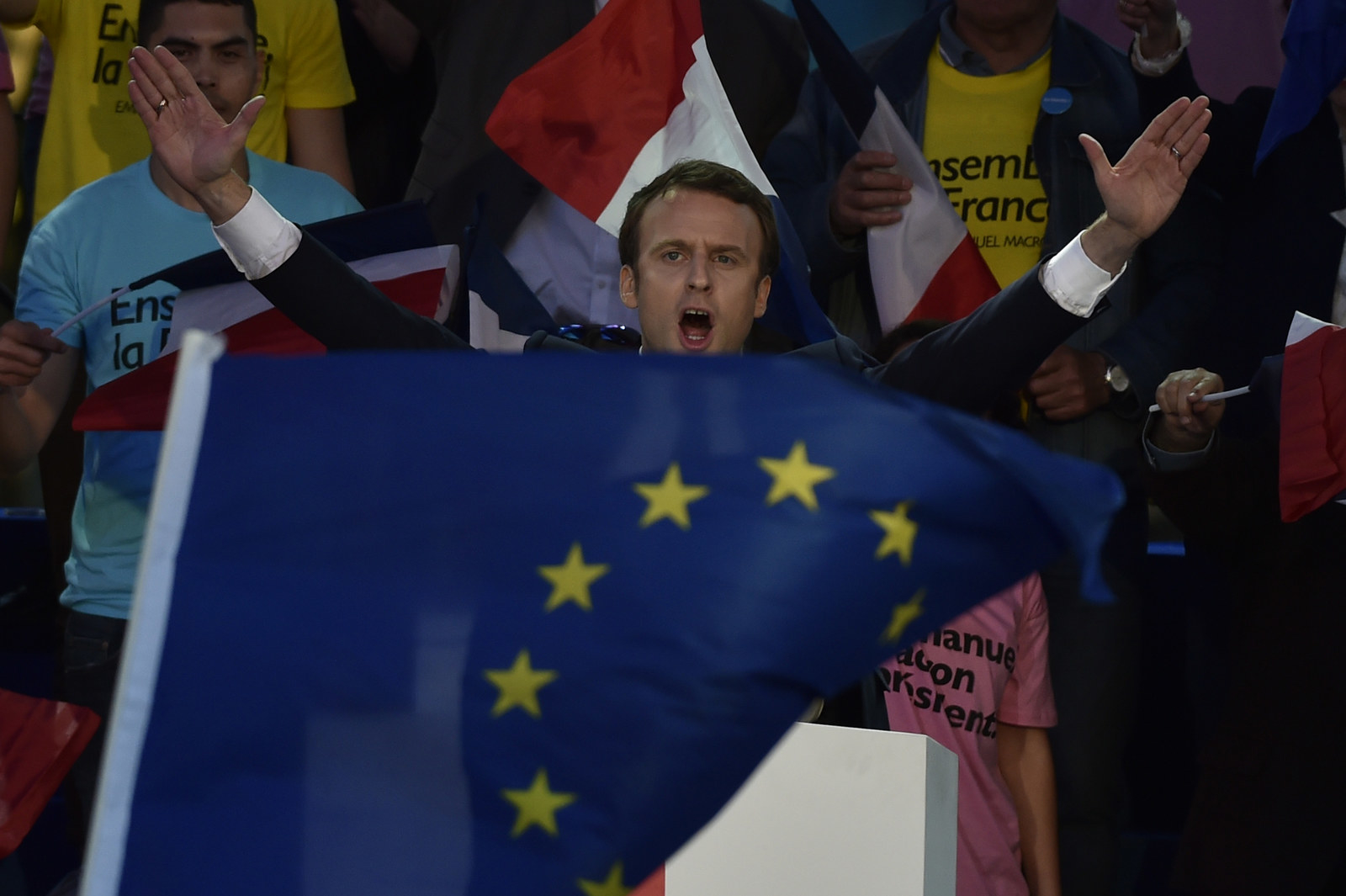
Emmanuel Macron, a pro-European Union centrist, easily won France's presidential election Sunday, defeating far-right nationalist Marine Le Pen with 66% of the vote, according to the French Interior Ministry.
The decisive result marks the end of a volatile and unlikely campaign that has redrawn French politics. For the first time, neither candidate in the runoff hailed from one of France's mainstream political parties. Macron has never been elected to public office, and founded his party, En Marche! ("On the Move!"), just over a year ago. Traditional political dividing lines were pushed aside, replaced with a contest shaped by economic anxiety, terrorism, and a national identity crisis.
Peuple de France, nous ne céderons rien à la peur. Nous ne céderons rien à la division. Nous ne céderons rien au me… https://t.co/HnjbEekuKu
"A new page of our history has turned this evening, I want that page to be one of hope and refound trust, the renewal of our public life," Macron said, making the case for national unity in a victory speech in Paris Sunday night.
"I understand the country is divided and that this has driven some voters to the extremes," he said. "I understand the anger, the doubt, the anxiety that many have expressed, and I will do everything I can in the coming five years to make sure they never have a reason to vote for extremism again."
Soon after the polls closed Sunday, Le Pen had called Macron to concede. "The French have chosen a new President of the Republic, and have voted for continuity," she tweeted later.
"Les Français ont choisi un nouveau Président de la République et ont voté pour la continuité." #Présidentielle2017
Current French President François Hollande also tweeted Sunday that he had called to congratulate Macron on the results. Prime Minister Bernard Cazeneuve wrote in a statement that the results showed voters had rejected the "fatal project of the extreme right."
J’ai appelé @EmmanuelMacron pour le féliciter chaleureusement pour son élection. Je lui ai exprimé tous mes vœux de réussite pour notre pays
The campaign to succeed Hollande, who will leave the presidency as France’s most unpopular president, was a watershed moment in French politics, shaped by a debate over identity, globalization, and the choice between open and closed economies and societies.
No two candidates embodied this choice as clearly as Macron and Le Pen, whose respective views of the world were diametrically opposed. According to one poll, unemployment, the EU, and security were the top election issues for voters.
Macron, who was endorsed by Barack Obama and German Chancellor Angela Merkel, ran on an unapologetically pro-EU platform, campaigning with a message that emphasized openness, free trade, and a defense of globalization.
Le Pen promised to exit the euro and hold a referendum on France's membership in the European Union, a key plank of her protectionist, nationalist, and populist manifesto. Deeming globalization and Islamism the two biggest threats facing France, she pledged to all but put a stop to immigration. Her campaign was endorsed by Brexit campaigner and radio host Nigel Farage, and received the tacit approval of Donald Trump.
The moment Emmanuel Macron's victory was announced to his supporters in Paris #frenchelection #presidentielle2017… https://t.co/4QgWvvrwNq
The 39-year-old Macron will now become the country's youngest ever president. And his victory rewrites the playbook of European politics.
"Macron made the most of a unique situation, in which the mainstream parties had destroyed themselves, and a vacuum in the center presented itself," Cas Mudde, an associate professor at the University of Georgia's School of Public and International Affairs, told BuzzFeed News.
The lesson, Mudde said, is that "the vast majority of the population in France, and Europe as a whole, is not looking for a populist vision, but for a convincing liberal democratic one."
In a dramatic end to the race, Macron's campaign was hit by a hacking attack on Friday night, and internal emails were leaked online. News of the hack came just hours before polling, campaigning, and election reporting were suspended on the eve of the election, as required by French law, and it is not yet known what impact, if any, it may have had on voting.
#Elections2017 : mobilisation en légère hausse, comprise entre 76%-80%, contre 73%-78% la semaine dernière… https://t.co/SmCyPKoipN
Rolling average of all polls asking voters who they would support in a Macron-Le Pen second round.
One of Le Pen's main problems is that for many, Sunday’s vote was about rejecting what she and her party, the National Front, stood for.
Although this trend isn't all that novel in French politics, where a runoff is often about the rejection of one of the two candidates, it has increased in recent elections. Nearly 60% of Macron voters were motivated by a rejection of the other candidate, according to a poll by the firm Odoxa.
By comparison, half of Hollande's vote in 2012 was a rejection of his opponent, Nicolas Sarkozy; five years earlier, a third of Sarkozy's vote was cast against his Socialist opponent, according to Odoxa.
“As we say in French, ‘in the first round, we choose; in the second, we eliminate,’” Bruno Jeanbart of the firm OpinionWay told BuzzFeed News after the first round.

Despite attempts Le Pen's attempts to clean up her party's image, the National Front's membership and leadership remain mired in xenophobia, populism, and nativism.
Le Pen herself denied French responsibility in the deportation of Jews during World War II. And when she temporarily stepped aside as party leader after the first round to focus on the campaign (and try to broaden her appeal), the chosen interim leader was forced to resign days later amid accusations of Holocaust denial.
